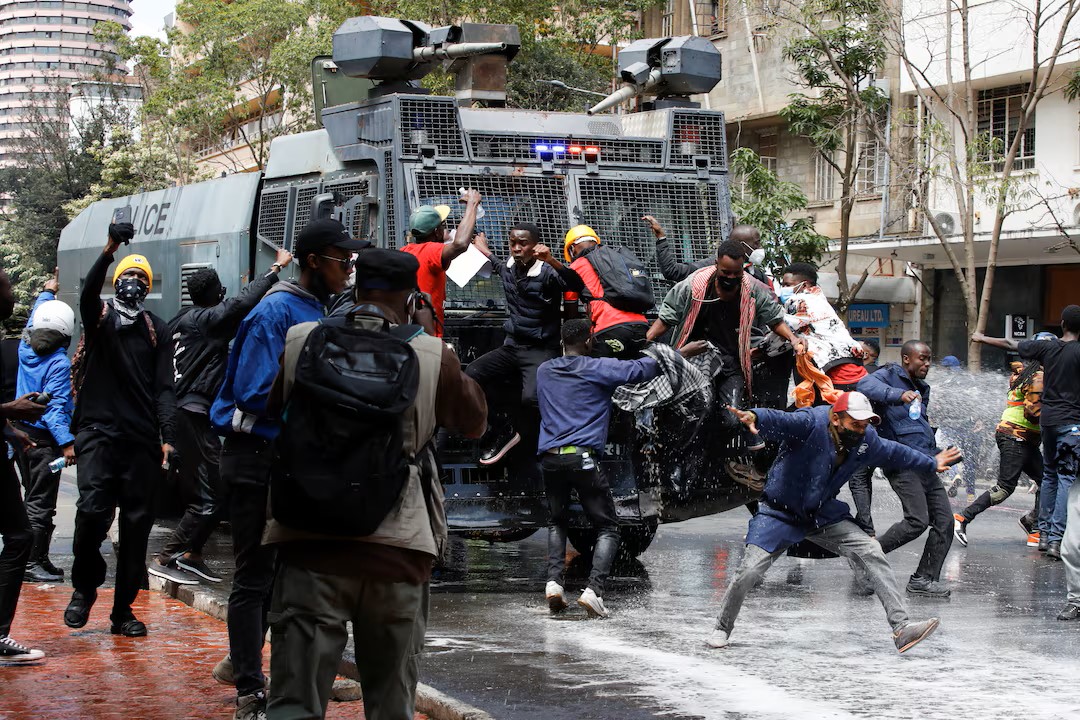Police fire on demonstrators trying to storm Kenya parliament, several dead

NAIROBI, June 25 (Reuters) - Police opened fire on demonstrators trying to storm Kenya's legislature on Tuesday, with at least five protesters killed, dozens wounded and sections of the parliament building set ablaze as lawmakers inside passed legislation to raise taxes.
In chaotic scenes, protesters overwhelmed police and chased them away in an attempt to storm the parliament compound. Flames could be seen coming from inside.
Police opened fire after tear gas and water cannon failed to disperse the crowds.
A Reuters journalist counted the bodies of at least five protesters outside parliament. A paramedic, Vivian Achista, said at least 10 had been shot dead.
Another paramedic, Richard Ngumo, said more than 50 people had been wounded by gunfire. He was lifting two injured protesters into an ambulance outside parliament.
"We want to shut down parliament and every MP should go down and resign," protester Davis Tafari, who was trying to enter parliament, told Reuters. "We will have a new government."
Police eventually managed to drive the protesters from the building amid clouds of tear gas and the sound of gunfire. The lawmakers were evacuated through underground tunnels, local media reported.
Internet services across the country also experienced severe disruptions during the police crackdown, internet monitor Netblocks said.
Protests and clashes also took place in several other cities and towns across the country, with many calling for President William Ruto to quit office as well as voicing their opposition to the tax rises.
Parliament approved the finance bill, moving it through to a third reading by lawmakers. The next step is for the legislation to be sent to the president for signing. He can send it back to parliament if he has any objections.
Ruto won an election almost two years ago on a platform of championing Kenya's working poor, but has been caught between the competing demands of lenders such as the International Monetary Fund, which is urging the government to cut deficits to obtain more funding, and a hard-pressed population.
Kenyans have been struggling to cope with several economic shocks caused by the lingering impact of the COVID-19 pandemic, the war in Ukraine, two consecutive years of droughts and depreciation of the currency.
The finance bill aims to raise an additional $2.7 billion in taxes as part of an effort to lighten the heavy debt load, with interest payments alone consuming 37% of annual revenue.
Opposition leader Raila Odinga called for the Finance Bill to be immediately and unconditionally withdrawn to make way for dialogue.
"I am disturbed at the murders, arrests, detentions and surveillance being perpetrated by police on boys and girls who are only seeking to be heard over taxation policies that are stealing both their present and future," he said in a statement.
The government has already made some concessions, promising to scrap proposed new taxes on bread, cooking oil, car ownership and financial transactions. But that has not been enough to satisfy protesters.
Tuesday's protests began in a festival-like atmosphere but as crowds swelled, police fired tear gas in Nairobi's Central Business District and the poor neighbourhood of Kibera. Protesters ducked for cover and threw stones at police lines.
People clambered over police vehicles stalled in the downtown streets.
Police also fired tear gas in Eldoret, Ruto's hometown in western Kenya, where crowds of protesters filled the streets and many businesses were closed for fear of violence.
Clashes also broke out in the coastal city of Mombasa and demonstrations took place in Kisumu, on Lake Victoria, and Garissa in eastern Kenya, where police blocked the main road to Somalia's port of Kismayu.
In Nairobi, people chanted "Ruto must go" and crowds sang in Swahili: "All can be possible without Ruto". Music played from loudspeakers and protesters waved Kenyan flags and blew whistles in the few hours before the violence escalated.
Police did not respond to Reuters requests for comment.
ORGANIC MOVEMENT
Thousands had taken to the streets of Nairobi and several other cities during two days of protests last week as an online, youth-led movement gathered momentum.
Protests in Kenya have typically been called for by political leaders who have been amenable to negotiated settlements and power-sharing arrangements, but the young Kenyans taking part in the current demonstrations have no official leader and have been growing increasingly bold in their demands.
While protesters initially focused on the finance bill, their demands have broadened to demand Ruto's resignation.
The opposition declined to participate in the vote in parliament, shouting "reject, reject" when the house went through the items one by one. The bill will then be subjected to a third and final vote by acclamation on the floor of the house.
The finance ministry says amendments would blow a 200 billion Kenyan shilling ($1.56 billion) hole in the 2024/25 budget, and compel the government to make spending cuts or raise taxes elsewhere.
"They are budgeting for corruption," said protester Hussein Ali, 18. "We won't relent. It's the government that is going to back off. Not us."








